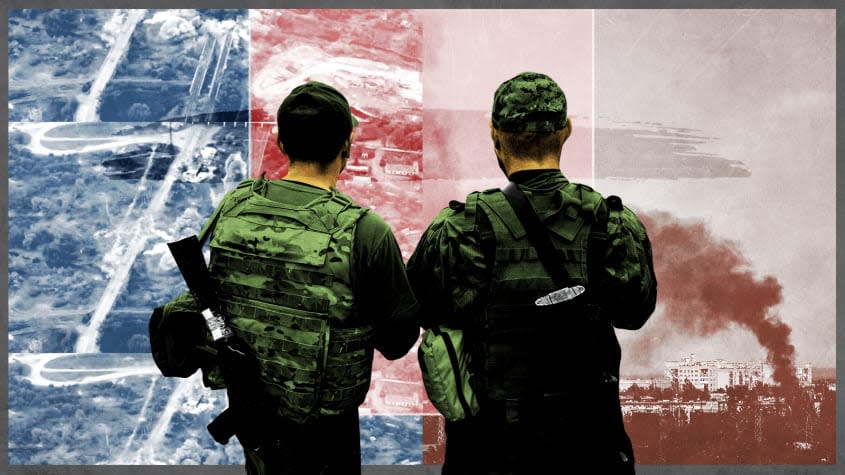What the Battle of Sievierodonetsk tells us about Russia's goals

Russian forces have seized control of most of the strategically important Ukrainian city of Sievierodonetsk. Here's everything you need to know:
Why is Sievierodonetsk important?
Sievierodonetsk — the name of which means "North Donetsk" — is a manufacturing city located in eastern Ukraine's Luhansk Oblast just across the Siverskyi Donets River from twin city Lysychansk. The two cities had a combined pre-war population of around 200,000.
In May 2014, pro-Russian fighters captured the city and prevented residents from voting in that year's Ukrainian presidential election. Ukrainian government troops took back the city two months later.
Last month, having been driven back from Kharkiv further north, Russia refocused its eastern offensive on the twin cities, surrounding them on three sides and destroying the bridges connecting them, but failing to achieve a full encirclement.
Then, last week, Russian forces launched an all-out assault on Sievierodonetsk, supported by withering artillery barrages. If the city falls, Russia will have eliminated the last major pocket of Ukrainian resistance in Luhansk Oblast.
Russian state media claims the goal of the offensive is to "liberate" Ukrainian-held territory belonging to the Luhansk and Donetsk People's Republics, which Russia declared independent countries prior to the invasion. U.S. officials believe the republics' Russian-backed sovereignty is a temporary arrangement, however, and that the Kremlin plans to hold phony referendums to annex those territories very soon.
The battle for Sievierodonetsk
"The Russians are storming, consolidating in the center of Sievierodonetsk, while continuing to destroy infrastructure and industrial facilities," Luhansk Governor Serhiy Haidai said Tuesday on Telegram.
Leonid Pasechnik, the leader of the Russian-backed Luhansk People's Republic (LPR), said Tuesday that around a third of the city had been captured. The same day, Haidai estimated Russian forces controlled about half of Sievierodonetsk before upping his estimate to 70 percent early Wednesday. He also wrote that Lysychansk remains "completely under Ukrainian control."
On Wednesday, Mayor Oleksandr Stryuk said Russian forces held 60 percent of Sievierodonetsk, Ukrainian forces held 20 percent, and the remaining fifth was a contested "no-man's land."
Chechen leader Ramzan Kadyrov — whose troops are fighting in Sievierodonetsk alongside Russian and LPR forces — said Wednesday that the city's "residential sector" was "under full control" and that only a "mopping-up operation" remained. Kadyrov admitted, however, that some Ukrainian fighters — who he called "shaitans" or evil spirits — were still conducting operations in the industrial zones in the western part of the city, closer to the river.
Haidai confirmed this, writing on Telegram that Ukrainian troops had engaged in "street fights," launched "test counterattacks," and even captured six "racists."
If Ukrainian forces continue to hold this territory, the Battle of Sievierodonetsk could become a repeat of the Battle of Mariupol, where Ukrainian defenders held out inside the city's massive steel plant for over a month.
Scorched-earth tactics
Pasechnik told Russian state media outlet TASS on Tuesday that his forces were aiming "to preserve the city infrastructure first and foremost."
That may have been the goal, but sources on the frontlines describe the situation very differently. "Almost 100 percent of the city's critical infrastructure has been destroyed, 90 percent of the housing stock has been damaged, 60 percent of which critically, i.e. it cannot be restored," Haidai wrote on Telegram, denouncing the Russian attackers as "uncultured orcs."
The two sides also swapped blame over who was responsible for blowing up a nitric acid tank at Sievierodonetsk's Azot chemical plant. According to The Washington Post, Haidai accused the Russians of "exposing residents to toxic fumes," while the LPR military claimed Ukrainian forces destroyed the storage tank in order to obstruct Russia's advance.
Quentin Sommerville of BBC described watching "from a rooftop in Lysychansk as, on the horizon, its twin city of Sievierodonetsk was being bombed indiscriminately. Shells were landing every minute on its length and breath. Sievierodonetsk was burning." Haidai estimated that around 1,500 civilians, including more than 50 children, had been killed.
Russian forces are reportedly relying heavily on their artillery advantage, launching heavy barrages ahead of any ground advance. "There's a lot of artillery. Bombardments are like a nightmare, we shoot one round, they shoot 10," a Ukrainian soldier named Vladimir told Sommerville. Matthew Schmidt, an associate professor of national security and political science at the University of New Haven, told the Post Russian forces were "bludgeoning their way through" Sievierodonetsk with artillery.
The shelling got so bad that, as Russia began its assault, Haidai told the 13,000 civilians still trapped in the city to shelter in place. Safe evacuation was impossible. Ukrainian troops even gave up on trying to assess their losses. Both Vladimir and Haidai issued pleas for more Western artillery to close the gap.
The U.S. is sending advanced medium-range rocket systems to Ukraine as part of its latest military aid package, but they might not reach the front in time to make a difference.
The big picture
On Saturday, the U.S.-based Institute for the Study of War described the Battle of Sievierodonetsk as indicative of just how much Russia has lowered its ambitions since the invasion began on Feb. 24. Far from seizing the capital and toppling the government, Russia is now engaged in a "desperate and bloody offensive to capture a single city in the east while defending important but limited gains in the south and east," the think tank assessed.
On Tuesday, the ISW suggested that Ukraine has decided to allow Sievierodonetsk to fall, a decision that is "strategically sound, however painful." By refusing to match Russian President Vladimir Putin's "mistaken prioritization" and desire for "largely symbolic gains," Ukraine can conserve its forces to launch counterattacks where they're needed most, the ISW assessed.
You may also like
COVID vaccines can't keep up with new Omicron subvariants
Elon Musk tells Tesla employees to return to office or resign
Goats are giving firefighters in Northern California an assist

